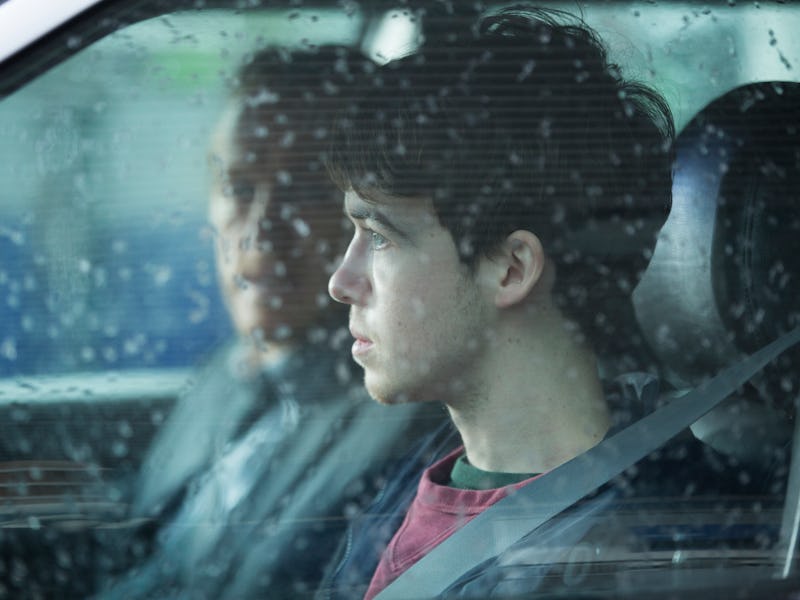Bad Things Happen to Bad People in ‘Black Mirror’ Season 3
How "Shut Up and Dance" and "Hated in the Nation" make us question techno-morality.

Charlie Brooker’s anthology series Black Mirror is known for its bleakness, but those complaining about its jet black tone are missing the nuances that make it one of the most intellectually stimulating shows on TV right now.
The third season, now streaming on Netflix, still traffics in near-future cautionary tales that make viewers take a long look at their own increasing reliance on technology. But, it also takes a sharper look at concepts we’ve been struggling with as a society since, well, forever.
Two episodes in particular, “Shut Up and Dance” and “Hated in the Nation”, confront morality in more searing ways than previously seen on the show. The show has its dark technological twists, but it also portrays the quandaries of asking whether doing bad things to bad people makes those actions redeemable. Brooker is simply the messenger, and it’s up for us to judge.
“Shut Up and Dance”
The season’s third episode starts off straightforward enough, with its Saw-with-less-gore narrative construct, until spinning everything on its head in a whirlwind twist that’s so unsettling that your brain might purposefully miss it.
Kenny (Alex Lawther) is an awkward and shy teen, working a minimum wage job as a busboy at a chain restaurant. One day after a particularly tough shift at work, he decides to masturbate to online porn, not an uncommon decision, but unbeknownst to him, he’s recorded via his laptop camera by anonymous trolls. They threaten him over text message, telling him that they’ll send the video to his whole contact list if he doesn’t follow their exact demands.
The trail leads him to join up with another victim named Hector (Jerome Flynn) who was caught cheating on his wife with a hooker — “I’m an alright bloke. I swear I am,” he tells Kenny, “when stuff’s normal.” And it all seems like a darkly funny slapstick comedy of blackmail until the trolls force Kenny into robbing a bank and then a fight to the death with a pedophile. “What’d they get you for?” the dejected man asks Kenny. “I just looked at some photos,” he sobs back. “Yeah, I just looked at pictures too,” the man says. “How young were they?”
The tragedy is that no matter how well any of the victims adhered to the anonymous instructions, each target receives a text with the grinning 4chan troll face and has their secret leaked to the world. As for Kenny, a frantic call from his mother reveals he wasn’t just masturbating to legal porn in the comfort of his own home. Kenny was actually looking at pictures of underage kids.
When you sift through the technological implications, it’s a scathing bit of biblical morality of bad people getting their swift comeuppance from an unseen godly force. But, after all, the tech stuff is what makes it a Black Mirror episode. It isn’t just about anonymous internet justice via a gruesome guilt trip game. Like the twist itself, the episode makes us question the dangers of digital vigilantes playing god even when victims like Kenny ultimately deserve their punishment.
You obviously can’t come to the defense of a pedophile, but Kenny’s aw-shucks persona (thanks to Lawther’s incredible performance) makes him creepily sympathetic removed from his disturbing actions. “Shut Up and Dance” is most similar to Season 2 episode “White Bear,” where a woman struggles through what seems like post-apocalyptic nightmare only to find out it’s an elaborate but legal simulacra of hell set up to perpetually punish her for her own horrific actions of murdering a child. Both episodes seem to suggest that while good and evil isn’t cut and dry, the people who have such appalling secrets deserve whatever they get even if it’s revealed through similarly horrific means. Or, the show is at least out to tempt people into taking that interpretation.
“Hated in the Nation”
The final episode of the season sees Brooker tackle his own spin on the Scandi-noir police procedural genre. This time, we’re thrown into an investigation led by disillusioned vet Karin Parke (Kelly Macdonald) and newbie Blue Coulson (Fay Marsay) looking into targets of social media backlash who begin dying grisly and mysterious deaths. A notorious journalist who writes an op-ed criticizing a disability rights activist who committed suicide, an American rapper who publicly mocks a kid for imitating his act, and a regular girl who posted a social media photo of herself fake-peeing on a war memorial all face the wrath of Twitter rage and deadly consequences.
Faye Marsay (far left) and Kelly Macdonald (far right) in "Hated in the Nation"
The clues start falling into place when Parke and Coulson realize government sanctioned autonomous robotic bee drones that have replaced actual now-extinct bees (a delightfully twisted and appropriate bit of Black Mirror detail) have been hacked to do the bidding of people on social media who all participated in a “#DeathTo” hashtag, leading to the deaths.
The hivemind critique of anonymous, consequence-free online rage, even when it means a person’s life is at stake, goes one step further when the episode suggests such solidarity isn’t always right. The original hacker turns the autonomous drone swarm onto the metadata of everybody who used the hashtag in one final act of deadly retribution.
In the surprisingly optimistic but still discouraging coda of “Hated in the Nation”, the computer villain gets his own requital, but the bigger point is made. No one is really as anonymous online as they think, and, like “Shut Up and Dance”, justice can prevail even when it doesn’t seem like justice at all. Whether you take solace in that is up to you.